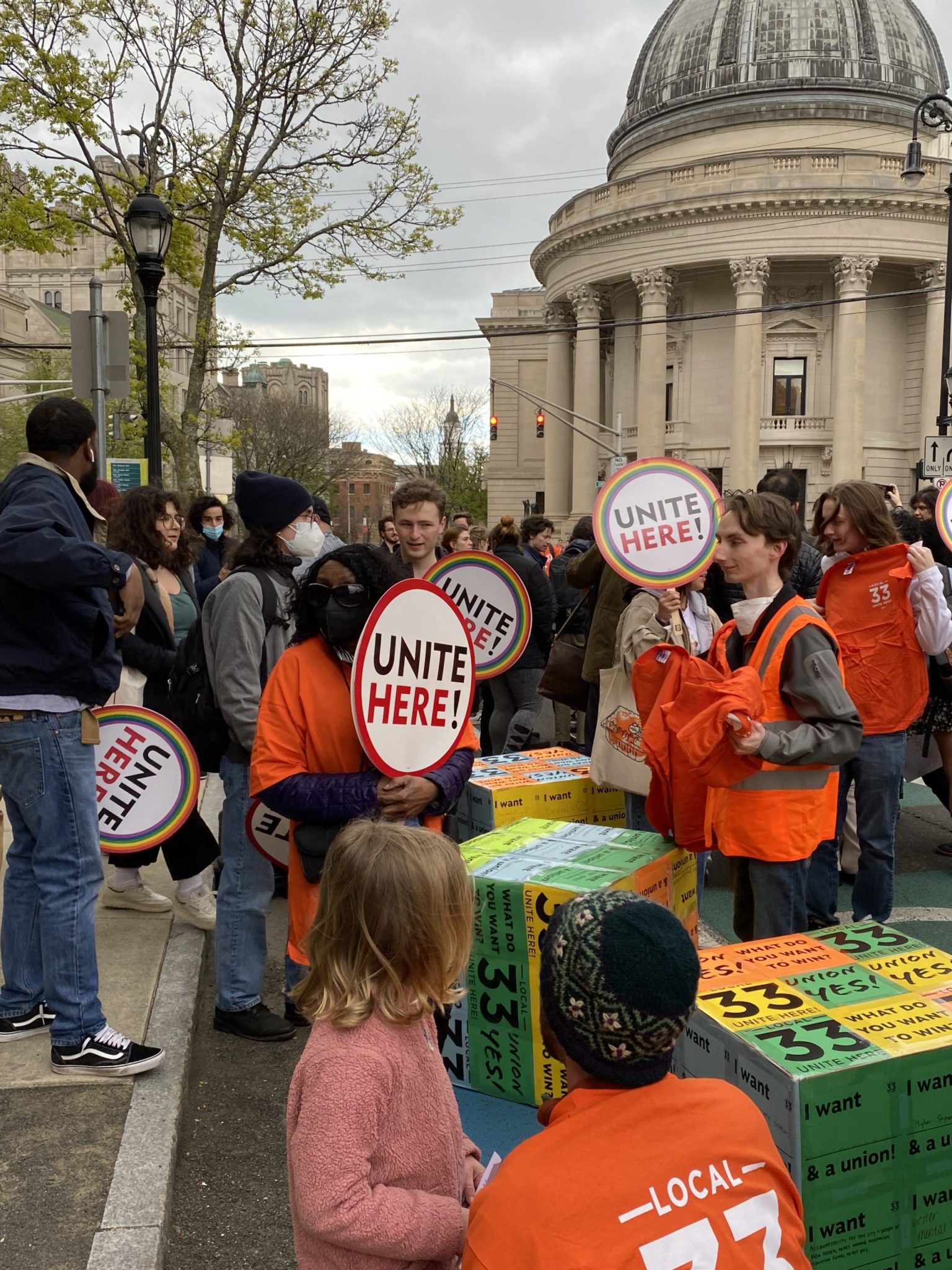Local 33 renews calls for labor contract
The unrecognized union for Yale’s graduate students raised their demands for a contract amid similar protests at peer institutions and an ongoing national labor rights movement.

Megan Vaz
Local 33, the unrecognized Yale graduate student union, rallied to celebrate receiving signed support from a majority of graduate students in April.
Addressing hundreds of people, speakers at the rally included Local 33 activists, elected officials and unionized workers at Yale and other institutions. After a first round of speakers, Local 33 leaders delivered over 1,600 signed statements of support for unionizing to the office of University President Peter Salovey at Sheffield-Sterling-Strathcona Hall. Members of the group have expressed wanting a “seat at the table” as the University makes decisions on pay, health and dental care coverage, safe working conditions and other issues.
“We will get Yale to follow the law and acknowledge that graduate workers are workers. We will win a union!” said Local 33 Co-President Paul Seltzer GRD ’23. “We will build power for the working people across the city, and we will win together!”
Several peer institutions have negotiated contracts with graduate workers in recent years, including Harvard, Brown and Columbia. Yale, however, continues to oppose Local 33’s efforts to unionize.
Some rally speakers came to Yale from institutions where they had previously been union members, like Cecelia Harold GRD ’24, who spoke about the lack of pay security that some graduate students must contend with in hazardous work environments.
“I know the difference that a union job can make, and not being one medical disaster away from complete financial ruin,” said Harold. “I had the benefits and protections of a contract and collective bargaining power … The main difference between there and here at Yale is I don’t have a contract and I don’t have protections for my work in my lab here at Yale.”
Others spoke to problems with Yale’s current healthcare plan for graduate workers, additionally emphasizing issues they have faced with dental care. Seltzer said that his dental insurance plan did not cover his emergency root canal procedure, forcing him to pay $1,000 out-of-pocket, while Buğra Sahin GRD ’26 said that even with coverage under Yale’s premium dental plan, he recently spent $3,000 on dental work.
Echoing other state and city elected officials who have expressed support for Local 33, Board of Alders President Tyisha Walker-Myers argued that Yale must recognize the union as part of its broader commitment to equity in the city. Myers, who has long served as chief steward for Yale’s Local 35 union for service and maintenance staff, recalled Yale’s refusal to recognize her own right to unionize in the 1980s.
“You want to say you’re a world renowned institution about research and learning and teaching,” Walker-Myers said. “Well guess what? The graduate student teachers teach. It’s work — they do work — and it’s time that you recognize it. So we will be back if you don’t concede politically, and we want you to do it now.”
Successful efforts to secure contracts at several peer institutions were influenced by the National Labor Relations Board’s 2016 ruling stating that graduate students at private universities hold the right to unionize. Although the Trump administration’s NLRB later proposed a reversal of the rule, a 2021 NLRB ruling affirmed graduate students’ rights once again.
The unrecognized union has faced several hurdles throughout its history beyond Yale’s refusal to negotiate. This includes earlier denunciation for using aggressive tactics to recruit members and a parody anti-GESO group called GASO formed by critics at the graduate school. In 2016, after a legal dispute with Yale, Local 33 continued to draw criticism as “undemocratic” for opting to hold eight NLRB-approved department-by-department union elections instead of a vote throughout the entire graduate school student body. The organization collected union authorization cards from a majority of graduate students earlier that year. But at the time, the cards did not hold legal legitimacy because NLRB did not recognize graduate student unions.
Yale refused to negotiate a contract while some departmental union elections were pending in April 2017, prompting an unprecedented and highly-publicized hunger strike by a rotating slate of Local 33 members that lasted almost four weeks. Local 33 later withdrew the unionization petitions submitted on behalf of the eight departments preceding a Trump-appointed addition to the NLRB in late 2018.
“Graduate students at Yale are primarily students learning to be scholars and teachers, with teaching assistant opportunities built into the graduate student curriculum,” former University spokesperson Tom Conroy said in 2018. “Enhancements to graduate student support —such as expanded family support — continue to be made every year, usually based on well-researched proposals from the Graduate Student Assembly.”
During this year’s rally, Local 33 Co-President Ridge Liu GRD ’24 said the University took advantage of Trump’s NLRB to bolster their opposition to unionization, even as they broke with other private universities.
Now that the Biden administration’s NLRB has warmed to private graduate school unions, Local 33 holds renewed hope of reaching negotiations with the University over a contract. Madison Rackear GRD ’25, who delivered the majority signatures of support to Salovey’s office, referred to the rally as a “celebration” and told the News she hoped it would demonstrate to the University that graduate student workers are workers.
“Yale supports open and robust discussion on the topic of graduate student unionization, with respect for everyone’s viewpoint,” University spokesperson Karen Peart wrote to the News. She noted a two-year plan to raise annual competitive living stipends for graduate students, which was announced days prior to the rally.
Before being rebranded as Local 33 in 2016, the union was originally named the Graduate Employee and Student Organization.



